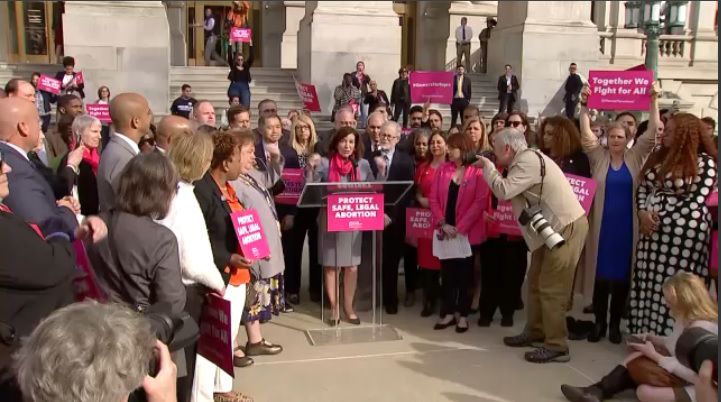Democratic elected officials in New York have signaled they will take action to enhance the state's current abortion laws after the release of a draft ruling at the U.S. Supreme Court that could lead to the overturning of Roe v. Wade.
If the court does rule and issue the opinion that became public this week, abortion laws would be turned back to the states unless Congress approves a nationwide law setting policy. In New York, a heavily Democratic state where the party maintains statewide power, measures could easily be approved in the coming weeks.
Here are five things to know as lawmakers and Gov. Kathy Hochul may try to do.
1. What laws are already on the books?
New York is among the Democratic-leaning states with liberal abortion laws already on the books. In 2019, New York lawmakers and then-Gov. Andrew Cuomo approved the Reproductive Health Act. The measure, which was meant to codify Roe v. Wade into state law, allows a pregnancy to be terminated after 24 weeks if a woman’s life is in danger or the fetus is not viable. It also allows a licensed or certified health care practitioner to perform abortions.
2. What would a constitutional amendment do?
State lawmakers are considering a variety of constitutional amendments meant to enshrine the right to abortion access in the state. The question remains how expansive lawmakers want to write the amendment. Some legislators are calling for a narrowly written amendment that would deal with the pending Supreme Court ruling.
But some legislators are crafting amendments that would be wider in scope and issue a broad series of protections based on gender. In a Capital Tonight interview on Wednesday, Senate Majority Leader Andrea Stewart-Cousins indicated the more expansive amendment is under consideration.
“I think that the idea now is to create a broad-based constitutional amendment that pretty much says that ‘we respect you for who you are’,” she said. “Obviously, we also want to (include) the pregnancy outcomes piece of that, which talks about the Roe piece.”
3. What is the Legislature considering?
There's no shortage of eagerness among Democrats to take up legislation designed to strengthen the existing laws.
One proposal announced by lawmakers this week would create a fund within the state Department of Health that is designed to expand access to abortion in New York. The proposal would create a program to award grant funding to providers and non-profit organizations that provide abortions.
At the same time, the measure is meant to help abortion providers build out capacity if Roe v. Wade is overturned and fund care for those who lack coverage or if coverage is unusable.
"The Reproductive Freedom and Equity Fund will address gaps that providers and organizations have uncovered in their provision of care," said state Assemblywoman Jessica González-Rojas, who is sponsoring the bill along with Sen. Cordell Cleare. "It will also help us address the incredible demand that will now increase because of this expected rollback. New York will lead where SCOTUS has failed."
4. What will the governor do?
Gov. Kathy Hochul has said she will consider executive actions to bolster abortion laws in the state. That could also include providing support to women from states where abortion would be outlawed to receive care in New York.
At the same time, the state could boost telehealth services for women who are seeking an abortion.
5. What are abortion opponents saying?
Republican candidate for governor Lee Zeldin, a congressman from Long Island, was not pleased the ruling was leaked to the media. He told Spectrum News 1 this week the justices at the Supreme Court should be given the time to deliberate on the question before the ruling is finalized by the end of this year.
He has previously told abortion opponents he would appoint a "pro-life" state health commissioner if elected governor.
The Rev. Jason McGuire, the executive director of New Yorkers for Constitutional Freedoms, was cautiously optimistic the ruling would lead to Roe being overturned. But he also said this week it's unlikely the state's abortion laws will go in the direction of more conservative states.
"For me, it's not just a fiscal concern. It really is a social concern, a moral concern and frankly it's a disrespect of laws of other states to think that we would want to circumvent the laws that other legislatures take. That should be troubling for New York legislators," he said.
